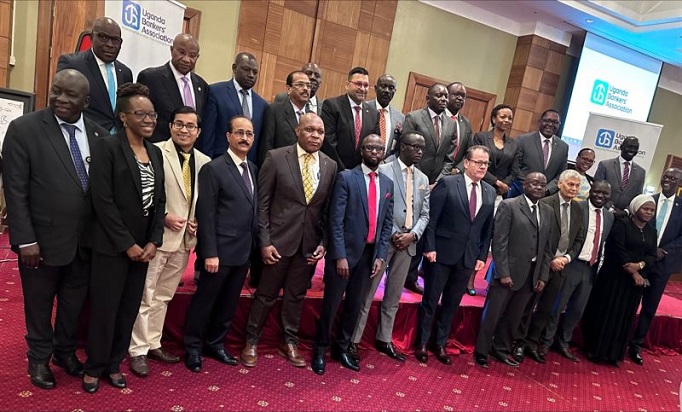Officials from Uganda Bankers’ Association, Bank of Uganda, Ministry of ICT and bank CEOs in a group photo after the launch of the BIGF/UBA Photo
The Uganda Bankers’ Association has issued guidelines on how to mitigate fraud within Uganda’s financial sector, with one of the proposals entailing all commercial banks to blacklist customers, staff and collaborators convicted of fraud.
The revelation was made by Sarah Arapta, Chairperson, Uganda Bankers’ Association, while unveiling the Banking Industry Guidelines on Mitigation of Fraud (BIGF) at Sheraton Hotel in Kampala, where she defended the proposal to cut individuals and companies found guilty of fraud from Uganda’s financial institution on grounds that fraud is a significant threat not only to the financial services but also to the wider economy as a whole, since it pauses grave challenges to its stability, credibility, and public trust.
“The blacklist shall entail both customers, collaborators and staff for whom judgement or conviction by a court of law has been secured. Being on the blacklist will warrant denial of service to that individual or firm depending on the circumstances, by all members participating in the BIGF either permanently or for such period of time as may be recommended by the fraud committee,” noted Arapta.
Michael Atingi-Ego, Deputy Governor, Bank of Uganda in his remarks welcomed the guidelines and he further called on players in the banking sector to ensure that the Guidelines are effectively implemented in order to uphold the integrity of Uganda’s banking sector.
He said, “We believe that by strengthening oversight mechanisms and pushing the banking industry to prioritize fraud prevention, detection and deterrence, Bank of Uganda aims to hold the integrity of financial institutions and maintain public trust in the banking system. So, the Banking Industry Guidelines for Mitigation of Fraud and the revised code of conduct that we are launching today are therefore very important milestone, but they only just mark the beginning, the real test lies with effective industry implementation.”
Atingi-Ego assured the Association that the Central Bank will stand shoulder to shoulder with the banking industry and also called for the need to bring on board all sector players like investigators and judiciary in the fight against fraud in Uganda’s financial sector.
“So together, let us entrench an atmosphere of ethics, and consumer protection and make our banking sector the gold standard of trust. This will foster public confidence, and pave way for a more resilient banking system that protects depositors, stimulates economic growth and benefits everyone. It is a collective responsibility and actions are our greatest strength,” he added.
However, the Association noted that before an individual or company is added to the blacklist, they must have been confirmed to have aided or abetted a cybercrime affecting a BIGF member and confirmation shall include validated reports or data obtained from the Courts of Law in Uganda.
The Association defended its decision noting that over the years, the banking industry and overall financial sector in Uganda has grappled with fraud which is not unique to Uganda, but the scale, velocity and complexity has kept evolving.
“This evolution of fraud trends has been partly brought about by several developments in the market, some of which include; A technological revolution that has changed the face of banking and what we now call the financial eco-system. The market has equally changed with a surge in youth population under 30 years old with a preference for digital solutions and ability to easily pick, adopt and follow activities positive or negative from any part of the globe,” noted Arapta.
Arapta also revealed that the Guidelines provide for the creation of the grey list of which the placement on the grey list means the matter has moved from a suspicious fraud incident/involvement to internal investigations being concluded and matter has been reported to Police, but conviction in court has not yet occurred.
She explained, “Placement on the grey list requires member participants in the BIGF to be cautious and on the lookout regarding any transaction where that party is involved. The grey list shall for all intent and purposes remain an industry watchlist of individuals/entities involved in fraud. The grey list shall only be used to alert members and ask them to be more cautious when dealing with individuals on the grey list.”
The Uganda Bankers Association also added that the Guidelines are intended to; establish clear and standardized procedures for reporting fraud incidents within the financial services sector, facilitate the sharing of relevant information among financial institutions, regulatory authorities, and law enforcement agencies and provide for a secure and user-friendly platform which will facilitate the seamless sharing of fraud related information among members.
According to Uganda Bankers’ Association, the new Guidelines will; enhance collaboration, expedite investigations, and enable a more proactive, approach in combating fraud. strengthen fraud prevention measures within financial institutions by providing guidance on risk assessment, fraud detection, and internal controls and provide for a blacklist of fraudsters.
The Uganda Police Annual Crime Report indicated that by the end of 2022, out of the total cases of Economic & Corruption Crimes reported to Police, 2,649 cases were taken to Court, 942 cases were not proceeded with, while 9,616 cases are still under inquiry.
The Force added that Cyber (Computer) crimes increased from 286 in 2022 to 258 cases in 2021, while crimes reported by Banks and Other Corporate Frauds were recorded at 82 in 2022 compared to 102 in 2021. However, out of the total cases taken to Court, 303 cases secured convictions, 03 cases were acquitted, 16 cases were dismissed while 2,327 cases are still pending in Court. Comparison of cases of Economic & Corruption Crimes from 2020 to 2022 There has been a general increase in cases of Economic & Corruption Crimes reported to the Police countrywide from 10,089 cases in 2020 to 13,207 cases in 2022.





